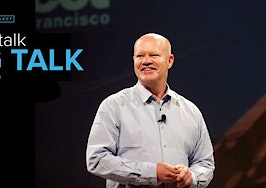In Greek mythology, Icarus ignored his father’s instructions not to fly too close to the sun — then the wax in his wings melted, and he fell into the sea.
In the mid-2000s, California real estate broker Ed Krafchow reached his professional vertex. The shaggy-haired, ex-academic had 4,500 real estate agents in 130 offices spread across three states, including an uber swath of California, the hottest real estate market in the world.
“It’s our intention to be at 10,000 agents within the next five years,” Krafchow predicted in an interview with a local business park journal in 2004.
A recession and tech innovations
Like Icarus, Krafchow’s herculean ambitions to expand his empire — just as the housing market cratered — melted his (and many brokers’) proverbial wings.
As he encamped in the wake of the national recession, a sea of technology innovations swept across the real estate business while a flourishing Keller Williams and a gaggle of new indie entrants seized market share.
In the last couple weeks, Krafchow’s empire was broken into several smaller companies, leaving him with no stake in his now-fragmented real estate powerhouse.
Did he sell his company in parts? Was it reorganized into smaller firms? Did Krafchow retire?
Yes to all of the above.
Realogy, which helped with the creation of the new companies, said, “Ed Krafchow, broker/owner of Better Homes and Gardens Real Estate Mason-McDuffie, is retiring after a long and distinguished career. Mason-McDuffie and [BHGRE] have worked together to find new and dynamic ownership opportunities for the brokerage firm.” They will all be Better Homes and Gardens Real Estate franchises.
Like many older brokers with heady geographical footprints, Krafchow, 73, never fully recovered from the housing market meltdown eight years ago, ultimately choosing to exit the business. Before the breakup, his agent count was down to about 1000 agents and 28 offices and his operations were consolidated in Northern California.
Other big brokers face the same fate if they don’t confront a tsunami of formidable business challenges.
Sky-high agent commission splits zap margins, as does an expensive office space portfolio. Competitive threats from the Keller Williams agent-recruitment juggernaut and better-capitalized startups like Compass, Opendoor and Redfin are stealing agents and eroding market share.
The technology bar to compete gets higher and higher. Declining commissions wreak havoc on profit-and-loss statements. And Zillow and realtor.com monopolize home-shopper and seller eyeballs, giving brokers no other choice than to do business with the giant portals.
Riding the boom years
Joseph Mason launched what became Mason-McDuffie Real Estate in 1887, a one-man real estate and insurance business with offices in Berkeley and San Francisco.
After Duncan McDuffie joined Mason in 1905, the company pioneered the “planned unit development” concept. Then, Realtors were civic leaders and partners in the building of America.
A graduate of the Univerisity of California-Los Angeles with a master’s degree in Islamic Studies and Middle Eastern History and a doctorate in Eastern Religions, Krafchow was 39 when he became an agent at Mason McDuffie and purportedly listed 37 houses his first year. In 1997, he and his partner David Cobo with the financial backing of Prudential Real Estate and Relocation Services bought the Berkeley, California-based firm.
It became their launchpad for growing the company eightfold in just eight years.
At the time, this new generation of real estate leaders smashed the mom-and-pop company stereotype. Growth was their goal and they were successful without the help of private equity or venture capital.
These mega-brokers seized the opportunity when property as a lifestyle became a hot new investment class for aspiring Americans.
Young-gun brokers like Krafchow and Cobo rode the real estate booms — but many did not squirrel away enough funds to weather the bad times or to invest enough in tech, teams and innovation.
Threats emerge
With the launch of the commercial internet, 1996 was the year that set in motion big changes to come.
The real estate game had a new set of rules and new costs with a host of mighty new players like Google, Craigslist, Facebook, News Corp. and Zillow. More recently, a second wave of new technologies and business models are poised to test the old ways even more.
Once the drivers of the real estate industry, big brokers now take a back seat to their rogue and powerful agents, to seductive indie firms, to agile teams and to technology companies that dwarf their presence on the internet.
A new tribe of indie brokers began stealing business from the old-school big real estate firms who carried a hefty cost structure like too much expensive office space. One of the fastest-growing indie brokerages, Chicago-based @properties, allegedly has facility costs that are a fraction of its older rivals. Its margins purportedly break dance around competitors.
Lean and mean teams are also taking share from brokers.
They “are the potential agent phoenix rising,” said Steve Murray, president at Real Trends.
Recruiting agents is a slugfest with 360 degree competition from jab and grab indie brokers, the Keller Williams network effect, feisty teams and monied startups. Do you want to work for the yellow cab company or Uber?
Shining a light on out-of-touch habits, the au courant generation of real estate companies offer a collaborative work culture, a flat organizational structure, social media as a core company activity, community outreach built into the firm’s DNA, strategies for enabling and empowering teams and smart new ways of acquiring customers.
Basic real estate principles still apply, but adopting new technology tools and business tactics are essential for success. Brokers must try, test and deploy a litany of new technologies or risk being put out to pasture.
Consider the portals and consumer leads, once the domain of brokers and their agents — a gilded partnership. When the internet surfaced, they either mistakenly embraced the realtor.com salvation promise or they made slapdash efforts to offer a consumer proposition.
Neither strategy worked and now most internet leads are the domain of realtor.com and Zillow and its premier agents — not brokers and their top producers.
Another lion over the hill is Opendoor’s recent $210 million funding round, representing a potential threat to the listing side of the business, the soul of the traditional brokerage model.
For more than 100 years, brokers controlled the listings. But that sacred cow is now being chased around the barnyard by paper brokerages and an assortment of scrappy new start-ups. Industry protections once granted to traditional brokers have been wiped out by US Justice Department intervention and technology work arounds that make listing data more like a commodity product in a 99 Cent store than a membership at an exclusive club.
Is this an epitaph for long-established big brokers? For many, no, but only for those who adapt to the business shifts, partner aggressively, lean their machine, fight ferociously for market share and upend their vertical company culture.
Brokers are being advised to better identify their value proposition and communicate it more effectively.
Makes sense — but for some that may be like warning Sharon Tate to figure out her value proposition during Charles Manson’s minions’ helter-skelter murderous rage. My point: Broker woes are more fundamental than positioning.
Instead, the first step for big brokers is reassessing their underlying business proposition. They must confront the measurable threats from agent recruitment and retention to margin and commission compression and to how they make money in the future.
Those who don’t adjust their flight pattern may find their wings melting.







